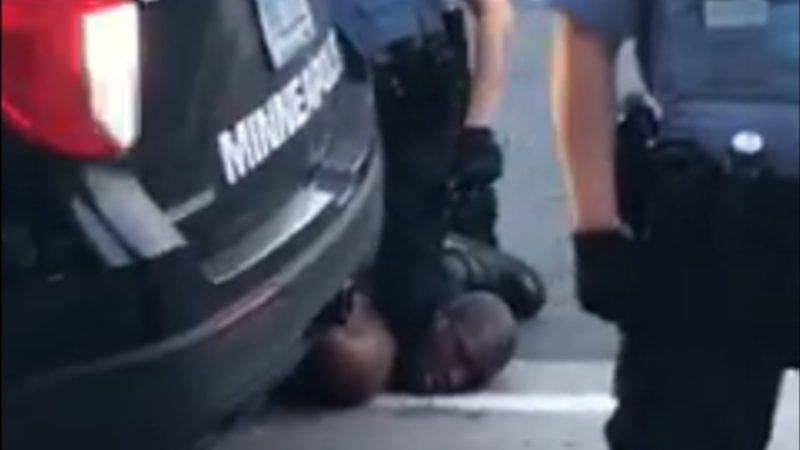US in the dock after police brutality incidents

Stay tuned with 24 News HD Android App

The United States has always been critical of the state of human rights in other countries. While offering its views about others it portrays itself as the role model of human rights for the rest of the world.
But on Monday, Washington correspondent of a Pakistani newspaper reported:
“We are done dying,” declared the National Association for the Advancement of Coloured People (NAACP) as violence re-erupted across America on Sunday over death of yet another African-American man, this time by police shooting.
Rayshard Brooks, 27, was shot dead by police on Friday night outside a Wendy’s outlet in Atlanta, Georgia, after he was found sleeping in the restaurant’s drive-through area.
“We do not have the full right to live in this country,” said NAACP, one of the largest civil rights groups in America, while urging people to join its campaign against racism. “Business as usual may cost us our livelihoods and our lives.”
Civil rights activists are trying to change social attitudes in America, particularly towards the African-American community. The movement gained momentum late last month when a policeman choked George Floyd to death in Minneapolis as dozens watched and filmed the incident.
The police cruelty stunned the American nation, causing countrywide protests that were the most intense in Minneapolis and in the nation’s capital, Washington. Tens of thousands of whites joined the protest, although Floyd was an African-American.
But appeals for peace, and the fear of a resurgence of Covid-19, eased the tensions until this weekend when Brooks’ death re-ignited the fire. The backlash started with a video that showed Brooks resisting arrest and then running away from two police officers after snatching a taser.
One of the officers chased Brooks and fired several shots into him after he turned the device, which is used to stun a detainee, towards the officer.
A crowd gathered outside the restaurant on Saturday and set it on fire, as an estimated 1,000 protesters watched it burning. Protesters then walked to a nearby highway, stopping traffic.
They locked arms, chanting “black lives matter” and “I can’t breathe,” slogans popularised during the protest against Floyd’s killing.
“I can’t breathe,” were Floyd’s last words and of another African-American, Eric Garner, who died in police custody in Staten Island, New York, in July 2014. He repeated the words 11 times before he died.
These words have now become an international rallying cry against racism as people across the globe continue to express solidarity with the protesters in the United States.
In Atlanta, police made several attempts to disperse the crowd and made dozens of arrests, but the demonstrations continued till Sunday morning. A small group emerged later and set the Wendy’s on fire again. Others spread out to various neighbourhoods.
As the unrest continued, the Atlanta Police Department fired officer Garrett Rolfe, who shot Brooks, and placed his partner, Devin Bronsan, on administrative duty.
The detailed report exposes the state of human rights in the world’s only super power – especially being ‘enjoyed’ by the black community.
Protests are going on in various countries, and it is hard to predict when they will come to an end. In the Trump rule there can’t be a better manifestation of “equality before the law”.
After going through this report, it can be said with certainty that the US police are as brutal – or ‘sympathetic’ - as Pakistan’s. What is happening in the US leaves no moral justification for it to criticize other countries on the pretext of poor state of human rights.
The UN Human Rights Council has decided to hold an urgent debate on Wednesday on allegations of “systemic racism, police brutality and violence against peaceful protests” in the United States and elsewhere.
The decision followed a request last week by Burkina Faso on behalf of African countries in response to the killing of George Floyd.
The United States is not a member of the 47-member state forum in Geneva, having quit it two years ago alleging bias against its ally Israel.
While the state of human rights in US has been fully exposed because of the killings and the subsequent protests, the ‘role model’ keenly monitors the state of human rights in other countries.
For example, its views on the state of human rights in Pakistan are worth reading.
A US government’s report for 2018 situation, released in 2019, says “The government’s human rights record remained poor, with serious problems in several areas. Despite attempts to reform and to professionalize the police, police committed numerous extrajudicial killings and tortured, abused, and raped citizens. While the officers responsible for such abuses sometimes were transferred or suspended for their actions, there is no evidence that any police officers were brought to justice. In general, police continued to commit serious abuses with impunity.”
The report further says: “The government imposes limits on freedom of assembly, movement, and--for the Ahmadis in particular--of religion”.
Will the US still raise such objections in future after its own detestable record?
